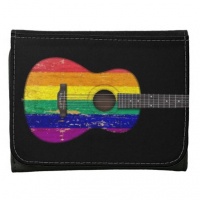Difference between revisions of "LGBTQ Rock Musicians"
| Line 59: | Line 59: | ||
* [[Linda Perry]], United States, Deep Dark Robots/4 Non-Blondes | * [[Linda Perry]], United States, Deep Dark Robots/4 Non-Blondes | ||
* [[Doug Pinnick]], United States, King's X | * [[Doug Pinnick]], United States, King's X | ||
| + | * [[Johnnie Ray]], United States, solo | ||
* [[Joel Reader]], United States, Pansy Division | * [[Joel Reader]], United States, Pansy Division | ||
* [[Sean Reinert]], United States, Cynic | * [[Sean Reinert]], United States, Cynic | ||
Revision as of 21:46, 19 May 2015
There was a time when declaring your homosexuality as a rock musician was a big no-no if you wanted to get ahead in the music industry. In fact, this situation is what prompted the founders of the all-gay rock band Pansy Division to create their group in 1991. John Ginoli, one of those founders, argues they were the first publicly out all-gay rock group (see his biography for a link to the story).
There are a few mentors in the industry that have paved the way for today's out generation and are prominent LGBTQ activists in their own right. Notable among these are Chuck Panozzo and Rob Halford.
Today, there is a significant number of publicly out LGBTQ rock musicians from numerous countries around the world. The groups these musicians belong to are often familiar - The Styx, Savage Garden, REM, Sleater-Kinney, Placebo, Scissor Sisters, The Smiths, Placebo, Grizzly Bear, Primal Scream, Vampire Weekend, The Pogues, and many more. But do you know the LGBTQ individuals?
The following LGBTQ individuals have been inducted into the Rock & Roll Hall of Fame:
- Clive Davis, United States
- David Lawrence Geffen, United States
- Elton John, Great Britain
- Janis Joplin, United States
- Laura Nyro, United States
- Ma Rainey, United States
- Dusty Springfield, Great Britain
We have identified a large number of LGBTQ rock musicians. They hail from Brazil, Sweden, the United States, Germany, Great Britain, Uruguay, Iceland, Australia, Canada, Belgium, Argentina, New Zealand, and Ireland. (Of course, 'rock' is a fluid definition, and we have excluded other LGBTQ musicians that more accurately fit the pop, synthetic, or folk category - albeit, a subjective assessment, but you can find them by searching for their biographies by name.) The times have changed and being an out and proud LGBTQ rock musician is no longer a barrier to a successful career.
- Rostam Batmanglij, United States, Vampire Weekend
- Cris Bonacci, Australia, Girlschool
- Roddy Bottum, United States, Faith No More
- Cazuza, Brazil, Barao Vermelho
- Mina Caputo, United States, Life of Agony (formerly Keith Caputo)
- Philip Chevron, Ireland, The Pogues
- Jayne County, United States, solo
- Ed Droste, United States, Grizzly Bear
- Cassia Eller, Brazil, solo
- Melissa Etheridge, United States, solo
- Melissa Ferrick, United States, solo
- Chris Freeman, United States, Pansy Division
- Gaahl, Norway,Gorgoroth/God Seed/Wardruna
- John Ginoli, United States, Pansy Division
- Tyler Glenn, United States, Neon Trees
- Debbie Googe, Great Britain, Primal Scream
- Laura Jane Grace, United States, Against Me!
- Brian Grillo, United States, Extra Fancy
- Rob Halford, Great Britain, Judas Priest
- Darren Hayes, Australia, Savage Garden
- Scott Hoffman, United States, Scissor Sisters
- Luis Illades, United States, Pansy Division
- Maja Ivarsson, Sweden, The Sounds
- Joe Jackson, Great Britain, solo
- Jobriath, United States, solo
- Jonsi, Iceland, Sigur Ros
- Janis Joplin, United States, various bands
- Bill Kaulitz, Germany, Tokio Hotel
- Ladyhawke, New Zealand, solo
- Paul Masvidal, United States, Cynic
- Brian Molko, Belgium, Placebo
- Steven Patrick Morrissey, Great Britain, The Smiths
- Bob Mould, United States, Sugar
- Frederico Moura, Argentina, Virus
- Kele Okereke, United States, Bloc Party
- Stefan Olsdal, Sweden, Placebo
- Dee Palmer, Great Britain, Jethro Tull (formerly David Palmer)
- Chuck Panozzo, United States, Styx
- Linda Perry, United States, Deep Dark Robots/4 Non-Blondes
- Doug Pinnick, United States, King's X
- Johnnie Ray, United States, solo
- Joel Reader, United States, Pansy Division
- Sean Reinert, United States, Cynic
- Renato Russo, Brazil, Urban Legion
- Fred Schneider, United States, B52s
- Will Schwartz, United States, Imperial Teen
- Jake Shears, United States, Scissor Sisters
- Martin Sorrondeguy, Uruguay, Limp Wrist
- Dusty Springfield, Great Britain, solo
- Michael Stipe, Great Britain, REM
- Justin Tranter, United States, Semi-Precious Weapons
- Corin Tucker, United States, Sleater-Kinney, and Corin Tucker Band
- Justin Utley, United States, solo
- Reg Vermue, Canada, Gentleman Reg

